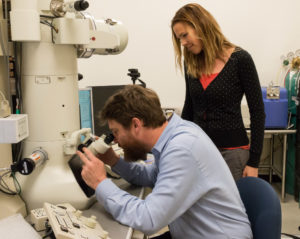Microbiome mind-meld
by Tosha Jupiter | March 29, 2017 12:28 PM
At a recent meeting of the Colorado State University Microbiome Network, topics of conversation turned to poop pills for koala bears, crime scenes and dead bodies, tilapia farms in Honduras, and buttons urging “put a microbiome on it.” And that’s exactly what the coordinator of the new organization, Elizabeth Ryan, wants.
“We want to bring together peers interested in enhancing CSU’s microbiome research capacity,” said Ryan, an associate professor of toxicology in the College of Veterinary Medicine and Biomedical Sciences. “And, importantly, we hope to build a community of people who want to share their work while learning from each other across the disciplines and applying microbiomes to their respective fields of study.”
A microbiome can be either all of the genetic material found within an individual microbe such as a bacterium, fungal cell, or virus, or the collection of genetic material found in a community of microbes that live together.
Bruno Sobral, One Health Institute[1] director and a member of the Microbiome Network’s steering committee, said he envisions a community that will create collective intelligence around microbiome work and connections among people who share interests and are exploring similar questions in different ways.
Microbiome Network meeting
Join Network members Wednesday, May 10, from 4-6 p.m. at the One Health Institute[1], Johnson Hall, Room 129.
Featured speakers include:
- Thomas Hill, Department of Atmospheric Sciences
- Micah Battson, Department of Food Science and Human Nutrition
“The Microbiome Network gives us the opportunity to share our work and resources,” he said. “It gives us space and time to explore our individual work with others who are interested in what we are doing through a different lens. The collective knowledge and the sheer energy that comes from people working together is what’s most exciting to me.”
New faculty

In fall 2016, CSU successfully recruited new faculty to help lead microbiome research and enhance knowledge of microbial communities and systems. Jessica Metcalf[2], assistant professor in the Department of Animal Sciences in the College of Agricultural Sciences; Pankaj Trivedi[3], assistant professor in the Department of Bioagricultural Sciences and Pest Management in the College of Agricultural Sciences; and Ed Hall[4], assistant professor in the Department of Ecosystem Science and Sustainability in the Warner College of Natural Resources were among the new hires. Each of them has a particular niche in microbiome study and, together, their work spans questions related to plants and soil, animal and human gut functions, animal decomposition, and aquatic ecosystems.
“One of the biggest challenges in microbiome research is to complement sequence-based analyses of intact microbiomes with additional information on the form and function of those communities,” said Hall. He added that some of the questions that arise include how fast they are growing, what they are eating, and what they are made of.
“Together, we can look at the system level and make some real strides in microbiome research,” Hall said.
Building on a strong foundation
Colorado State is committed to building on a strong foundation in microbial sciences.
“Hiring new microbiome faculty and the subsequent formation of the Microbiome Network represents CSU’s commitment to advancing impactful solutions in important problems related to microbial communities in air, soil, water, animals, and people,” said Alan Rudolph, vice president for research.
“CSU has longstanding expertise in microbial sciences and technology development, including fundamental research and its translation into innovative companies and work in the field. The network will extend this expertise and impact well into the future.”
Microbiome Faculty Steering Committee members include:
- Jan Leach, chair, College of Agricultural Sciences
- Elizabeth Ryan, Microbiome Network coordinator, College of Veterinary Medicine and Biomedical Sciences
- Matt Wallenstein, Warner College of Natural Resources
- Tiffany Weir, College of Health and Human Sciences
- Susan Delong, College of Engineering
- Graham Peers, College of Natural Sciences
- Bruno Sobral, One Health Institute
The Microbiome Network is exploring engagement and operations strategies. If you have ideas or want to be included in discussions and activities, email Elizabeth Ryan[5].
- One Health Institute: http://onehealth.colostate.edu/
- Jessica Metcalf: http://www.jessicalmetcalf.com
- Pankaj Trivedi: http://bspm.agsci.colostate.edu/pankaj-trivedi/
- Ed Hall: https://taurus.cnr.colostate.edu/people-directory/dir-profiles.cfm?pid=4EE8914E9C6F3A74AA8E88B3075B4937
- email Elizabeth Ryan: mailto:E.P.Ryan@colostate.edu?subject=microbiome%20network
Source URL: https://source.colostate.edu/microbiome-mind-meld/
Copyright ©2024 SOURCE unless otherwise noted.